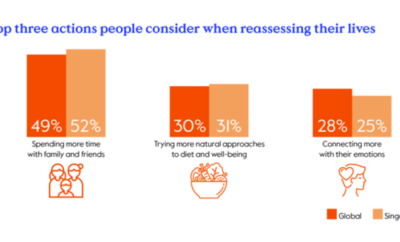
Health x Wellness
Being aware of Dengue despite the pandemic
Given the daily headlines about COVID-19, it is easy to pay attention singularly to the issue in front of you. However, it is important not to let our guard down against more familiar health situations. Singapore has shared its expectations that the dengue cases are on the rise.
The Active Age speaks with Dr Jacky Shee, Family Physician at Healthway Medical (Woodlands) about Dengue, how to increase vigilance and what to expect at the clinic if you are suspected of having dengue.
the Active Age (AA): Are we seeing people become highly informed about COVID-19 and pay less attention to other health threats at home such as Dengue?
Dr. Jacky Shee (JS): With the Covid-19 pandemic dominating headlines over the last few months, it is expected that many individuals are extremely concerned and consume a lot of information that is related to the virus.
With this heightened interest, I would caution that individuals be discerning in the information that they are consuming as not all sources of information are reliable.
However, in recent weeks, there has been more attention on dengue as the number of cases in Singapore increase. Hopefully, communities in Singapore will pay more attention to the threat of dengue and take active steps to prevent it.
AA: NEA has shared recent updates that dengue cases are on the rise, what do you think people can do to be more aware and vigilant?
JS: According to the National Environment Agency (NEA), there was a five-fold increase in the incidence of Aedes mosquito larvae detected in residential areas during the two-month circuit breaker period. It is highly likely that the confluence of the usual peak dengue season, heavy rains and circuit breaker periods have resulted in a spike in dengue cases in recent months.
With the number of weekly dengue cases exceeding 1,000 in the weeks ending 13 June and 20 June*, we could be expecting a higher risk of dengue transmission in the months to come. Individuals play and important role in preventing dengue.
Some steps they can take include:
- Applying insect repellent and wear long-sleeved tops and long pants, if staying in or heading out. This should be especially so when visiting a dengue cluster area
- Spraying insecticide in dark corners of the home, such as under the bed and sofa, and behind curtains
- Ensuring there is no stagnant water at home by overturning pails, and checking pipes in kitchen and bathroom areas
AA: What are some of the symptoms that we should be aware of regarding dengue, for parents/caregivers to take note of?
JS: Some of the symptoms of dengue include:
- Severe headache
- Nausea and vomiting
- High fever for two or more days
- Muscle & joint pains
- Skin rashes
If anyone is experiencing these symptoms and think they they may have dengue fever, seek medical attention immediately.
Individuals who are suspected to have dengue are recommended to apply mosquito repellent regularly to protect others around them from getting infected. As the mosquito becomes infected when it takes the blood of an individual carrying the virus, individuals with dengue should do their best to avoid getting bitten to prevent further spread of the virus.
Currently, all Healthway Medical’s GP clinics are distributing the mosquito repellents provided by the NEA to assist in stemming the spread of dengue.
AA: What can residents of a neighbourhood do – community-wise – if they are part of a dengue cluster, within the various guidelines issued for COVID-19?
JS: Those living within an identified dengue cluster should be more vigilant as they will have a higher risk risk of being bitten and infected with the dengue virus.
As many of us continue to work from home and spend large amounts of time at home, we should take the necessary precautions to keep our own homes safe.
These individuals should continue to take all the necessary precautions shared earlier, including the application of mosquito repellent even when you are at home.
AA: What is the process at the clinic/hospital when they encounter a suspect dengue case, especially during this phase of COVID-19 recovery?
JS: If we suspect that a patient may have dengue, we will run a dengue test and full blood count test in the clinic. If there are other conditions exhibited that could be linked to Covid-19, we may also send the patient for a Covid-19 swab test.
The results for the full blood count and dengue screening tests are usually available within the day, while Covid-19 swab tests can take up to two days.
In the meantime, patients will be given a medical certificate and asked to rest at home while waiting for their results. While waiting for their test results, patients should minimise contact with others.
Responses attributed to Dr Jacky Shee, Family Physician at Healthway Medical (Woodlands)









